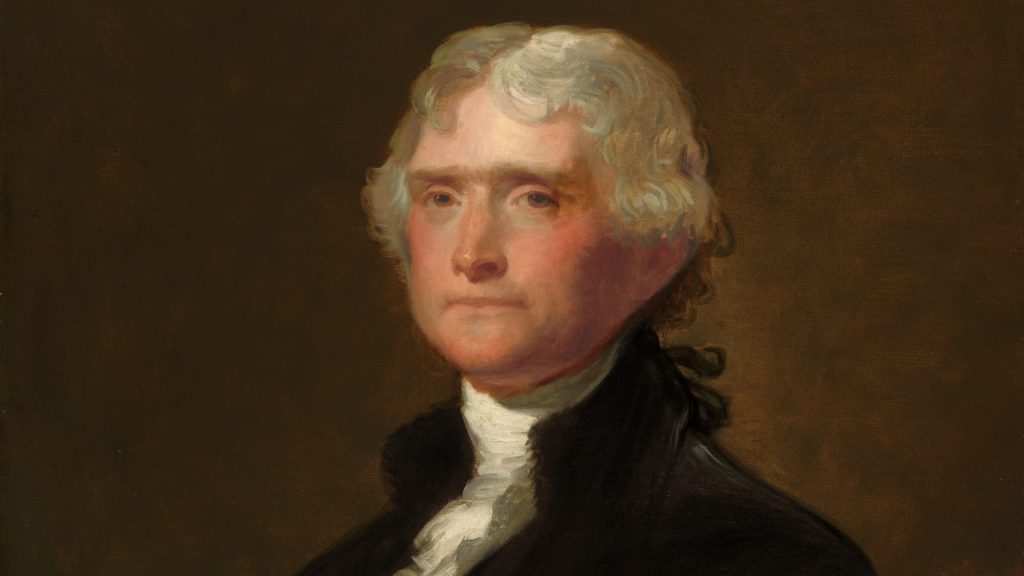Thomas Jefferson, 1848/1879. Artist George Peter Alexander Healy.
Heritage Images | Hulton Fine Art Collection | Getty Images
Before becoming president, ‘they are just like us’
Annie Nova: How much do presidents actually manage their own money? I imagine they outsource much of that strategizing and effort.
Megan Gorman: Well, up until most of them become president, they are just like us. They are managing their budgets and trying to grow assets. But what was striking in looking at their finances across different eras is that a lot of the same issues that we struggle with today, are ones that Americans have always struggled with.
The difference is that in many ways it is much harder today to achieve the American Dream.
After all, Richard Nixon was able to go to college in 1930 for $230 a year. That’s around $8,000 in today’s dollars. And, in 1886, Grover Cleveland could buy a home on 26 and ¼ acres about three miles north of the White House for $21,500, the equivalent of $700,000 today.
‘Money caused and causes anxiety for everyone’
AN: Who was the most frugal president?
MG: Calvin Coolidge was incredibly frugal. He would have told you he was “thrifty.” Part of this comes from advice he received from his father growing up: that it was important to save and allow money to compound. Even when he was in the White House, the head housekeeper complained that he was always poking his head in to check on the cost of food being purchased.
The one that surprises most people was that John F. Kennedy was pretty frugal as well. Just because he came from money didn’t mean he wasn’t keeping an eye on the bottom line. Throughout his life, friends noted that he was “tight with a buck” and monitored costs.
AN: Was there a president who overspent?
MG: The biggest spender of them all was Thomas Jefferson. Jefferson had very nice taste, and that taste was enhanced from his time in France. If there was ever a dinner party you wanted to attend, it was Jefferson’s. Even up to the time he passed away, he was still trying to buy wine on credit.
Interestingly enough, given the debt he had when he was dying — more than $2 million in today’s numbers, he was clever in that he made sure in his estate plan that assets passed to his daughter and son-in-law could not be attached by creditors.
Megan Gorman, author of All The Presidents’ Money.
Photo: Marc Cartwright
AN: For whom did money cause the most anxiety?
MG: Money caused and causes anxiety for everyone. That being said, some handled it better than others.
For instance, Ronald Reagan used budgeting as a mechanism to manage emotion when it came to money. This is no surprise given that he grew up in a financially unstable household with an alcoholic father. The Reagans would at times have to leave town in the middle of the night to get away from their landlord as they didn’t have the money to pay rent. As Reagan got older, he found that having a budget and sticking to it allowed him to manage his financial anxiety.
Early experiences informed money habits
AN: Who had the most financial struggles before becoming president?
MG: Harry Truman is one that easily comes to mind. Truman spent the first four decades of his life going through a lot of financial volatility. From his father losing all their money so he couldn’t go to college, to Truman having a series of unsuccessful business ventures including a zinc mine, an oil well and the famous haberdashery, he really struggled.
But it wasn’t until he was in the presidency that he was able to save his salary along with a special stipend he received for two years that was tax-free. At the time of his death, he was worth $750,000, or $8 million today.
AN: How did a president’s childhood experiences impact their financial behavior?
MG: The best example would have to be Herbert Hoover.
Hoover’s story could have gone completely wrong for him. He lost both of his parents by the age of 9. He and his siblings are split up among different family members but they share the same financial guardian. So from an early age, Hoover is required to budget and submit his expenses to this guardian.
As he becomes a teenager, he takes on bookkeeping for his uncle’s business and really learns to be a “financial apprentice.” The budgeting and bookkeeping have such an impact on his financial skills that he becomes the treasurer of his class at Stanford.
He just keeps building on his skill set again and again. That skill set would grow him great wealth — and allow him to do a lot of charitable work over his lifetime.
Money opps in post-presidential life
AN: Did presidents change their financial habits after their time in the White House?
MG: Before Gerald Ford left the White House in 1977, previous presidents went back to practicing law, wrote a book or died. But Ford changed that.
He built a substantial speaking career and served on corporate boards. At the time he did this, it was seen as a big risk. In fact, Carter made it clear when he left the presidency, he wasn’t going to take the same path as Ford.
Today post-presidential life has continued to evolve. Bill Clinton is still an in-demand speaker and the Obamas are building a media brand.
